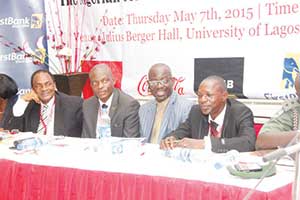•CPC, NERC, SON, NCC admit infringements
Consumer rights were brought to the front burner once again at the Nigerian Institute of Public Relations (NIPR) Lagos chapter second stakeholders’ conference at the engineering hall of the University of Lagos (UNILAG).

The event, organised by Addefort Limited, was held in collaboration with the mass communication department of UNILAG.
Participants agreed that Nigerian consumers have not been treated fairly, hence the urgency to strengthen law enforcement and implement consumer rights.
On the event
Lagos NIPR Chairman, Joseph Okonmah, commended “the support of all regulators that participated and our corporate sponsors; Airtel, Coca-Cola, First Bank and MTN for identifying with the Nigerian Consumer.”
He said the conference’s theme, “The Nigerian Consumer – Rights, Duties & Obligations”, was designed for regulatory authorities and corporate organisations to deliberate on issues affecting consumers.
Human and brand presence
Dignitaries and brands that made a huge impact with their presence included UNILAG Vice Chancellor, Professor Rahamon Bello (represented by Deputy Vice Chancellor, Management Services, Professor Duro Oni), and NIPR President, Rotimi Oladele (conference Chairman).
Other included former Lagos NIPR Chairman, Nkechi Ali-Balogun, and art expert, Shuaibu Husseini.
Art and Communication Faculty Dean, Professor Ralph Akinfeleye, delivered a paper on “The role of Public Relations in protecting the rights of the consumers”.
Regulators and organisations that also made presentations included the Consumer Protection Council (CPC), Nigerian Communications Commission (NCC), Nigerian Electricity Regulatory Commission (NERC), Standard Organisation of Nigeria, (SON), National Oil Spill Detection and Response Agency (NOSDRA), MTN Nigeria, and Airtel.
Advancing the cause of consumers
Oladele urged industry practitioners and government agencies and departments to use the NIPR platform to advocate a proper deal for consumers and to invlove all stakeholders.
“Protecting the rights of the Nigerian consumer is the collective responsibility of all stakeholders,” he stressed
Akinfeleye reminded everyone that the term “consumer” is a generic nomenclature for all.
For instance, he clarified, a producer of tea is a consumer of milk, and an agency in charge public power will rely on an agency responsible for water to make his day complete.
“We are all consumers but organisations in the country are treating consumers’ case in isolation as if they are not consumers themselves. This has to stop but it has to start with the government,” he counselled.
Akinfeleye, who shared about 21 case studies of consumer rights abuses in Nigeria, said telecommunication operators, banks, power suppliers, and airlines are the worst culprits.
“It is business as usual in telcos, banking, public power supply sector, and airlines. Consumers are treated with disdain in these sectors.”
He admonished organisations with poor customer experiences to deploy public relations to address grievances. “There is no organisation without consumer related issue but those that are successful are those that use PR to settle their crisis.”
Regulators’ eyes
Lagos CPC Head, Tam Tamunokonbia, spoke on the efforts being made by the commission to protect the rights of consumers and urged them to always demand for their rights by bringing complaints to the notice of the CPC.
NCC Executive Vice Chairman, Eugene Juwah, represented by his Public Relations Director, Tony Ojobo, insisted that the quality of telecoms service in Nigeria is not falling.
Said he: “Even if we wish to compare service quality with the situation in the 1970s to 1990s, up to 2000, or at the inception and during the telecom revolution years which began in 2001, or just the status in three to five years ago, we are uncomfortable to admit that the quality, or standard of services are falling.
“But we may argue that the challenges to quality of service are increasing at the same pace at which services are expanding to all the nooks and crannies of the country.”
He listed the challenges to include power supply, multiple regulation and taxation, right of way issues, vandalisation of telecoms infrastructure, and infrastructure deficit.
Juwah said the NCC is committed to ensuring that the telecoms operators deliver on their promises.
NRC Chairman/Chief Executive Officer (CEO), Sam Amadi, highlighted impediments to the power sector reform as gas supply shortages, fragile electricity transmission system, cost reflective tariffs, electricity market revenue shortfall, and metering.
He also listed threats to effective regulation, NEMSA Bill, challenges to subsidy disbursement, transitional electricity market (TEM), customer dissatisfaction and apathy, poor supply, and outrageous billing.
Amadi, represented by Uche Okoro, explained that the NERC has adopted two planks to address metering challenge.
He said “with the aim of facilitating and supporting the operators on one hand and protecting the consumer on the other, the commission introduced a ‘voluntary scheme’ known as Credited Advance Programme for Metering Implementation (CAPMI) to assist in dealing with the metering gap.
“Strong enforcement of the commitment made by the Discos (distribution companies) on closing the metering gap as contained in their business plans during the privatisation of the entities.
“Appropriate financial penalties will be imposed on the Discos once the AT&C losses are adjusted and cost- reflective tariff released.”
SON Director General, Joseph Odumodu, said the body has taken the fight against substandard products and goods seriously.
He disclosed a resolve to reposition SON towards higher productivity, particularly in the fight against the menace of substandard products importation, production, storage and distribution merged the enforcement, ports and border operation units into a full directorate called Inspectorate and Compliance Directorate (ICD).
This is to achieve the overall objectives of SON, particularly in its zero tolerance to substandard products.
Bottom line
Stakeholders reiterated that Nigerian consumers are the most violated, abused, and bartered yet friendly.
“If you give Nigerian consumers what they want you are already a success in your business because they are not demanding at all,” said public affair commentator, Idris Balogun.
All government agencies at the event agreed that new legislation may be required to tighten the noose on organisations that violate consumer right.
One speaker urged the National Assembly to make laws to protect consumers from substandard goods, fakery, and right forfeiture.


